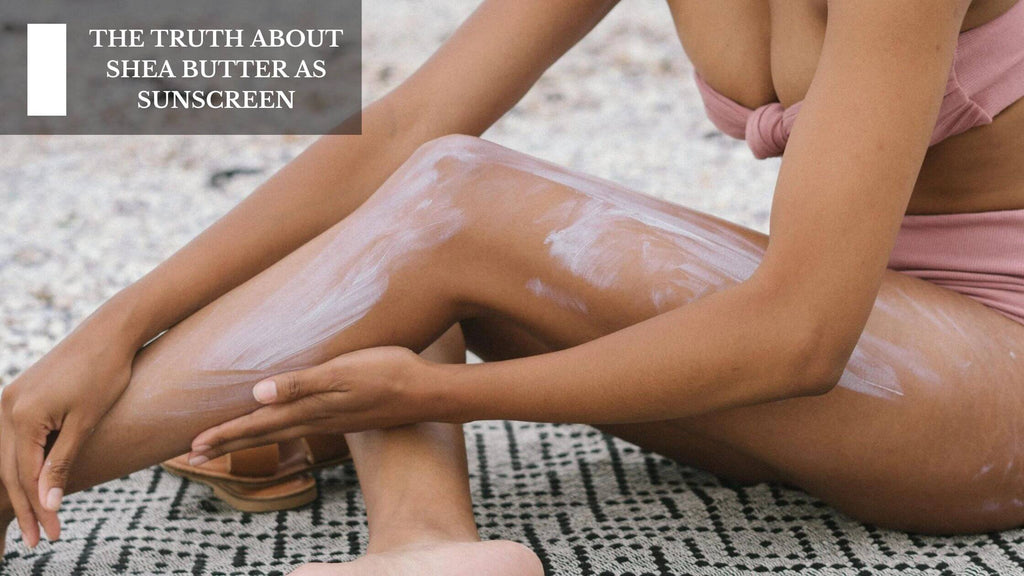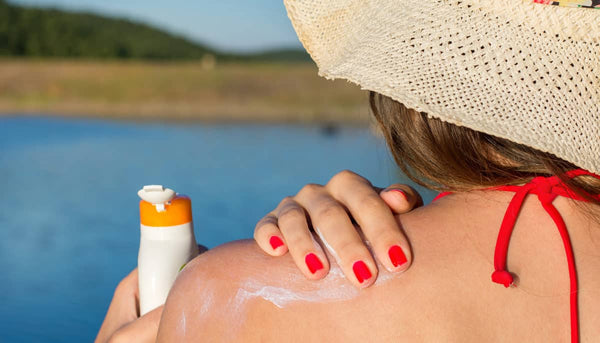The Truth About Shea Butter As Sunscreen

Shea butter is a natural moisturizing agent made from the fruit of the shea tree, indigenous to Africa and the Middle East. Shea butter is used in many skin and hair care products because of its ability to naturally hydrate, improve skin elasticity, and reduce signs of aging and dryness. It also has a high content of vitamins A, C, E, and F. For this reason, shea butter is often included in formulations as an emulsifier or solubilizer as well as a moisturizer for topical use on wet or dry surfaces. It's great, so long as you don't also apply coconut oil.
You may also like:
A recent study by Stanford University dermatologists showed that the combination of shea butter and coconut oil provided excellent protection against both UVA and UVB rays. However, when an SPF 15 sunscreen was applied over the combination of shea butter and coconut oil, it reduced the amount of ultraviolet damage to the skin by 50%! The answer relates to the chemistry behind sunscreens. When sunscreen is applied in conjunction with other moisturizers like shea or coconut oil, it can reduce its effectiveness by as much as 20%.
Is shea butter used as a natural sunscreen?
Yes, depending on the formulation. In the above study, the UVA protection of the combination was substantially reduced when coconut oil and shea butter were both applied over SPF 15 sunscreen. Presumably, keeping coconut oil at a low to moderate level of concentration in an oil-based formulation – or adding additional antioxidants – helps improve its effect as a sunscreen. Many folks have used shea butter to blend with other sunscreens to achieve better sun protection without compromising product performance or stability. As long as it's an oil-based formulation, it's generally reasonable to use it in tandem with other sunscreens.
Physical sunscreen ingredients reflect, scatter, or absorb UV radiation. They act on the surface of the skin by deflecting, scattering, or absorbing UV rays. Physical sunscreens include ingredients like titanium dioxide, zinc oxide, and iron oxide-based sunscreens as well as micronized versions of zinc and titanium dioxide. Chemical sunscreen absorbs the energy of UV radiation through chemical reactions within the active ingredient. These products usually contain active ingredients like avobenzone (Parsol 1789), ecamsule (MexorylTM), oxybenzone (benzophenone-3), octocrylene, and avobenzone.
Benefits of using shea butter as a natural sunscreen:
1) Protection from UV rays
Shea butter's SPF is about 7, which means it protects you from UVB rays. Although not as effective as chemical sunscreens, they provide good sun protection and reduce the consequences of sun damage over time.
2) Protect from environmental damage
Shea butter's emollient and humectant properties protect your skin from environmental damage like wind, pollution, and sun.
3) Protect from free radicals
Shea butter is a great antioxidant. Shea butter is rich in vitamins A and E as well as essential fatty acids that protect your skin from sun damage caused by free radicals.
4) Shelf life
Natural sunscreens degrade more quickly than chemical sunscreens since they do not contain any chemical stabilizers. This product is fine to use for a couple weeks after opening, but the antioxidants lose their potency over time so the sunscreen won't be effective after 6 months or so.
5) Provides hydration
Shea butter moisturizes the skin, which helps your sunscreen absorb better into the skin. Shea produces a natural barrier between the skin and the sun, so you won't get a "sunburn" after using shea butter.
6) Shea butter is the best natural sunscreen
Due to its high SPF value, superior protection from both UVA and UVB rays, stable effectiveness even after months of open use, and moisturizing effect. Shea butter is a great moisturizer for skin and hair, but it can also be used as a natural sunscreen in oil-based formulations. Since the combination of shea butter and coconut oil reduces the effectiveness of both UVA and UVB protection, it's best to use shea butter for moisturizing purposes only when applying sunscreen.
7) Blends well with other natural and chemical sunscreens
Shea butter is often used to blend sunscreen for better protection. Conversely, coconut oil is also added to sunscreens as an emulsifier due to its ability to maintain fluidity in the formulation.
8) As a natural sunscreen

Natural sunscreen should be non-medicated and chemical-free. If shea butter is used in a formula, it should be made from a mixture of other natural and non-chemical ingredients such as cocoa butter, coconut oil, beeswax, or other antioxidants. Shea butter can be used when you're going to be outdoors for several hours. However, as it's an oil product that will eventually deteriorate from its oxidation, it generally shouldn't be used frequently for sun protection.
9) Less irritating for sensitive skin
When it comes to SPF, the difference between 5 and 8 is insignificant; however, most people have very sensitive skin. Natural sunscreens tend to be effective without being harsh on the skin. Natural sunscreens can be used in combination with other skin creams or used as the sole moisturizer.
10) Properly formulated shea butter sunscreen
It can be used on sensitive skin, but stop using it if you begin to break out or develop irritation from it. A good natural sunscreen will not irritate your skin, even when you use it regularly. However, some people with sensitive skin may have an adverse reaction to its use.
You may also like:
FAQs:
1) How do I use shea butter as a natural sunscreen?
Because it is an oil, shea butter's texture should be mixed with an oil-based moisturizer. Generally, you should mix a small amount of shea butter with 7-10 drops of coconut or olive oil to create the formulation. It can be applied directly to the skin, but it's best used in conjunction with other oils like coconut oil and your favorite facial moisturizer.
2) What is the shelf life of shea butter?
Shea butter has a shelf life of about six months after it's opened. However, its benefits may not be as effective after several weeks or months. Natural sunscreens should only be used every 2-3 hours because they break down in UV light and lose their effectiveness. If you're exposed to sunlight for prolonged periods, it's best to apply a natural moisturizer with SPF 15-30 like coconut oil, and reapply it every 2 hours or so.


Leave a comment